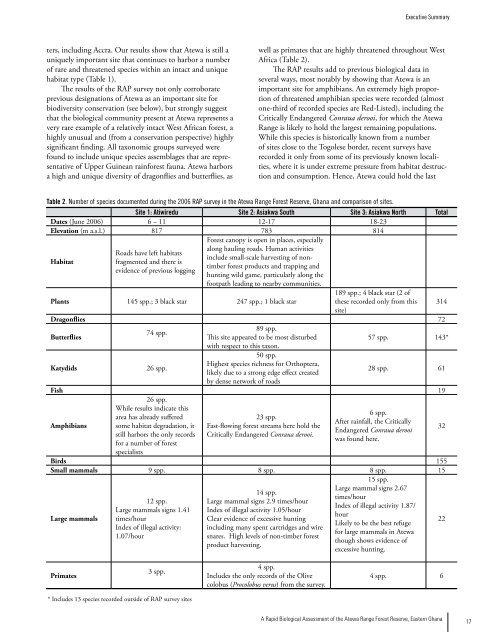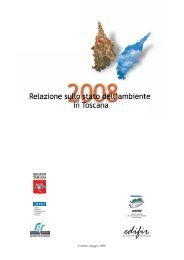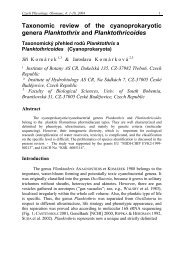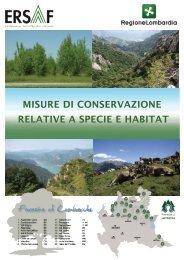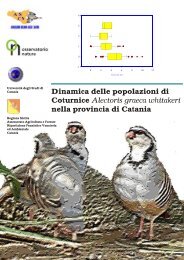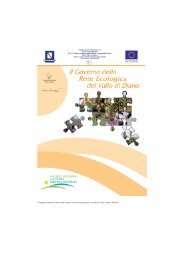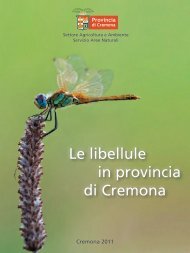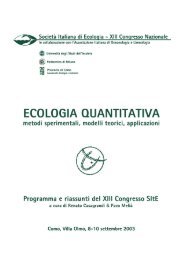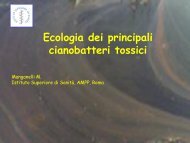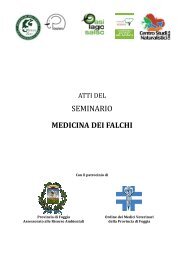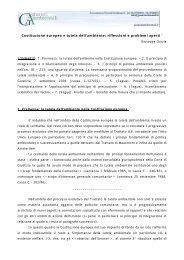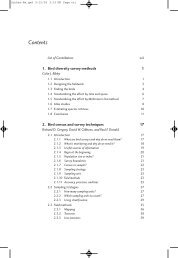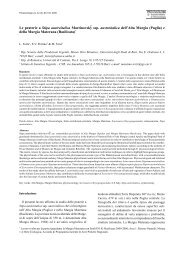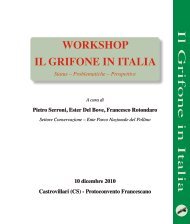Rapid survey of the birds of the Atewa Range Forest Reserve, Ghana
Rapid survey of the birds of the Atewa Range Forest Reserve, Ghana
Rapid survey of the birds of the Atewa Range Forest Reserve, Ghana
- No tags were found...
You also want an ePaper? Increase the reach of your titles
YUMPU automatically turns print PDFs into web optimized ePapers that Google loves.
Executive Summary<br />
ters, including Accra. Our results show that <strong>Atewa</strong> is still a<br />
uniquely important site that continues to harbor a number<br />
<strong>of</strong> rare and threatened species within an intact and unique<br />
habitat type (Table 1).<br />
The results <strong>of</strong> <strong>the</strong> RAP <strong>survey</strong> not only corroborate<br />
previous designations <strong>of</strong> <strong>Atewa</strong> as an important site for<br />
biodiversity conservation (see below), but strongly suggest<br />
that <strong>the</strong> biological community present at <strong>Atewa</strong> represents a<br />
very rare example <strong>of</strong> a relatively intact West African forest, a<br />
highly unusual and (from a conservation perspective) highly<br />
significant finding. All taxonomic groups <strong>survey</strong>ed were<br />
found to include unique species assemblages that are representative<br />
<strong>of</strong> Upper Guinean rainforest fauna. <strong>Atewa</strong> harbors<br />
a high and unique diversity <strong>of</strong> dragonflies and butterflies, as<br />
well as primates that are highly threatened throughout West<br />
Africa (Table 2).<br />
The RAP results add to previous biological data in<br />
several ways, most notably by showing that <strong>Atewa</strong> is an<br />
important site for amphibians. An extremely high proportion<br />
<strong>of</strong> threatened amphibian species were recorded (almost<br />
one-third <strong>of</strong> recorded species are Red-Listed), including <strong>the</strong><br />
Critically Endangered Conraua derooi, for which <strong>the</strong> <strong>Atewa</strong><br />
<strong>Range</strong> is likely to hold <strong>the</strong> largest remaining populations.<br />
While this species is historically known from a number<br />
<strong>of</strong> sites close to <strong>the</strong> Togolese border, recent <strong>survey</strong>s have<br />
recorded it only from some <strong>of</strong> its previously known localities,<br />
where it is under extreme pressure from habitat destruction<br />
and consumption. Hence, <strong>Atewa</strong> could hold <strong>the</strong> last<br />
Table 2. Number <strong>of</strong> species documented during <strong>the</strong> 2006 RAP <strong>survey</strong> in <strong>the</strong> <strong>Atewa</strong> <strong>Range</strong> <strong>Forest</strong> <strong>Reserve</strong>, <strong>Ghana</strong> and comparison <strong>of</strong> sites.<br />
Site 1: Atiwiredu Site 2: Asiakwa South Site 3: Asiakwa North Total<br />
Dates (June 2006) 6 – 11 12-17 18-23<br />
Elevation (m a.s.l.) 817 783 814<br />
Habitat<br />
Roads have left habitats<br />
fragmented and <strong>the</strong>re is<br />
evidence <strong>of</strong> previous logging<br />
<strong>Forest</strong> canopy is open in places, especially<br />
along hauling roads. Human activities<br />
include small-scale harvesting <strong>of</strong> nontimber<br />
forest products and trapping and<br />
hunting wild game, particularly along <strong>the</strong><br />
footpath leading to nearby communities.<br />
Plants 145 spp.; 3 black star 247 spp.; 1 black star<br />
189 spp.; 4 black star (2 <strong>of</strong><br />
<strong>the</strong>se recorded only from this 314<br />
site)<br />
Dragonflies 72<br />
89 spp.<br />
74 spp.<br />
Butterflies<br />
This site appeared to be most disturbed<br />
57 spp. 143*<br />
with respect to this taxon.<br />
50 spp.<br />
Katydids<br />
26 spp.<br />
Highest species richness for Orthoptera,<br />
likely due to a strong edge effect created<br />
28 spp. 61<br />
by dense network <strong>of</strong> roads<br />
Fish 19<br />
Amphibians<br />
26 spp.<br />
While results indicate this<br />
area has already suffered<br />
some habitat degradation, it<br />
still harbors <strong>the</strong> only records<br />
for a number <strong>of</strong> forest<br />
specialists<br />
23 spp.<br />
Fast-flowing forest streams here hold <strong>the</strong><br />
Critically Endangered Conraua derooi.<br />
6 spp.<br />
After rainfall, <strong>the</strong> Critically<br />
Endangered Conraua derooi<br />
was found here.<br />
Birds 155<br />
Small mammals 9 spp. 8 spp. 8 spp. 15<br />
15 spp.<br />
Large mammals<br />
Large mammal signs 2.67<br />
14 spp.<br />
times/hour<br />
12 spp.<br />
Large mammal signs 2.9 times/hour<br />
Index <strong>of</strong> illegal activity 1.87/<br />
Large mammals signs 1.41 Index <strong>of</strong> illegal activity 1.05/hour<br />
hour<br />
times/hour<br />
Clear evidence <strong>of</strong> excessive hunting<br />
Likely to be <strong>the</strong> best refuge<br />
Index <strong>of</strong> illegal activity: including many spent cartridges and wire<br />
for large mammals in <strong>Atewa</strong><br />
1.07/hour<br />
snares. High levels <strong>of</strong> non-timber forest<br />
though shows evidence <strong>of</strong><br />
product harvesting.<br />
excessive hunting.<br />
22<br />
32<br />
Primates<br />
3 spp.<br />
4 spp.<br />
Includes <strong>the</strong> only records <strong>of</strong> <strong>the</strong> Olive<br />
colobus (Procolobus verus) from <strong>the</strong> <strong>survey</strong>.<br />
4 spp. 6<br />
* Includes 13 species recorded outside <strong>of</strong> RAP <strong>survey</strong> sites<br />
A <strong>Rapid</strong> Biological Assessment <strong>of</strong> <strong>the</strong> <strong>Atewa</strong> <strong>Range</strong> <strong>Forest</strong> <strong>Reserve</strong>, Eastern <strong>Ghana</strong><br />
17


